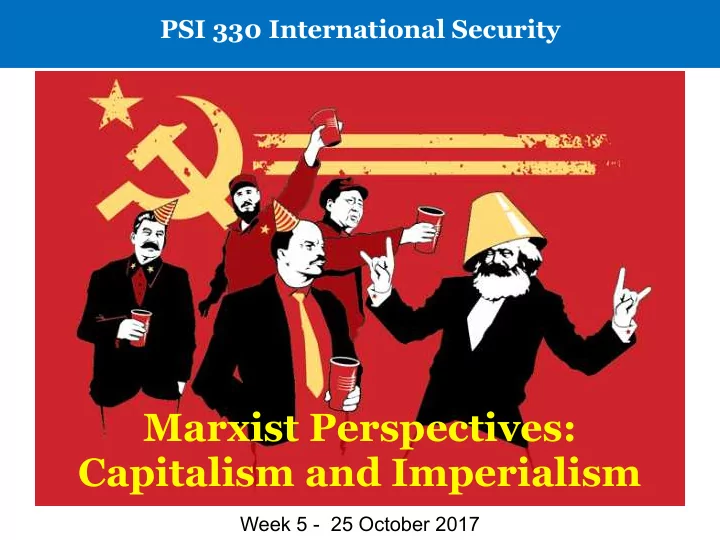

PSI 330 International Security Marxist Perspectives: Capitalism and Imperialism Week 5 - 25 October 2017
Marxist Perpectives: The Core • The Main Focus • Class Struggle and Material Interests of those classes embody • Mode of Production and production relations • Understanding of the International Relations • Marx: heterogeneous state of war and peace • Lenin: homogenous state of war among independent countries
Marxist Perpectives: An Overview • Approach to War and Peace • Is war progressive or reactionary for the proletariat? • What is the link between the military sector and economic progress? • How should one understand the role of the state for the defense of national economic interests on the international scene?
Classical Marxism • Explaining social change and sources of conflict • Class struggle have primacy over the forces of production • The conflict arise at the relations of production, reflecting upon the political structures • War is intrinsically linked to the class struggle • Occurrence of War at different levels: • At National Level: Revolts, Strikes and Civil War • At International Level: Inter-state war
Classical Marxism • Sources of War (International Level) • War between Capitalist and Pre-Capitalist Societies • Search for ever widening markets -> effectiveness of capitalist production outweighed the pre-capitalist production, as well as weakened political and military resistance. • Independent interstate relations can only happen among societies among similar modes of production
Classical Marxism • Mode of Production Determines How War are Fought (Engels) “Armament, composition, organization, tactics and strategy depend above all on the stage reached at the time in production and on communications. It is not the “free creations of the mind” {D. Ph. 43} of generals of genius that have had a revolutionizing effect here, but the invention of better weapons and the change in the human material, the soldiers.” (Engels 1947) “the military capabilities of a particular weapons system, which define its role in a particular military unit, reflect the manufacturing capabilities of a particular defense company” (Kaldor 1982, p. 15) • Contradiction in arms production
Classical Marxism
Classical Marxism • Economic conflict tend to replace military ones • Economic Interdependence • Unwillingness of Bourgeoise to wage war with other developed nations due to costs • Capitalism may tend to more peaceful than the previous modes of production • War can still occur: • inequality, exploitation, and the domination process engendered by the international division of labour • Class struggle continues
Classical Marxism • Socialism would bring Peace (Engels) • abundance, absence of exploitation, solidarity. • Workers are by nature devoid of national prejudice • National independence and bourgeois democracy was necessary for crushing the vestiges of feudalism and in the development of the proletariat. (Marx)
Theories of Imperialism • Marx: • Imperialism as another way to counteract decreasing profits • Imperialism as a force of social change • Hilferding: • The Imperialist policy as a result of rise of financial capital • Financial capital -> The necessity of protecting the domestic industries -> Reinforcement of the role State -> Increased Militarism • Development of firms and internationalization -> Agreement between powerful capitalist states • Exploitation of non-industrialized nations
Theories of Imperialism • Luxemburg: • War is the result of differences modes of production • Imperialism as a solution for the demand blocks • Opening up new markets and exploration of non-capitalist states • Conflict among Capitalist states may arise due to disagreements of sharing the territories • Military expenditures as a solution to defend and conquer empires.
Theories of Imperialism • Lenin: • Imperialism = Economic and Political Division of the World • Institutions and forces -> Imperialism • Institutions = monopoly capital, merger of industrial and bank capital, and the state • Forces created by Finance Capitalism: • Superabundance necessitates the search for profitable investment • Export of capital, rather than export of goods. • Underconsumption drives monopolies to seek market in the undeveloped areas of the world. • Control of markets and sources of raw materials is sought.
Theories of Imperialism
Revolutionary War • The Mass Resistance to War vs The War of the Masses • Transferring the class struggle into military (via conscription) (Lenin) • Anti-war sentiments • Mao (On Guerrilla Warfare): • A war waged for the emancipation of people • Guerrilla Warfare as a part of overall anti-imperialist struggle is employed by the weak • Aims of the Guerrilla Warfare: • Weaken the adversary through local attacks • Expand the theatre of war to national level • Transferring the hegemony from external power to an immanent power
Militarism • “the project of policing a global system of multiple states has generated [an] open-ended militarism which displays to the world a constant threat of war, any time anywhere, with no clear objective or end- game” (Wood 2007, 166) • Changes in military technology instigates militarism by creating constant arms production economy (Shaw 1988) • Arms production will bring the demise of the Capitalist production (Engels) • Political advantage: Creating national unity against an external threat • Dividing the working class • Economic advantage: • Arms Production and the Restoration of the Rate of Profit • The Critique of Economic Advantage
Fundamental Questions • How would Marxist theory answer the four fundamental questions about security? • What is Security? • Whose security? • What are the primary threats? • How can security be achieved?
Recommend
More recommend